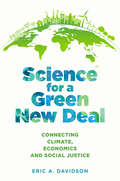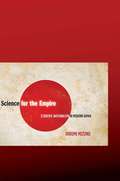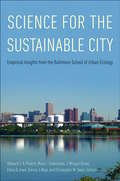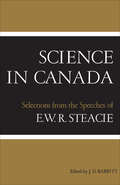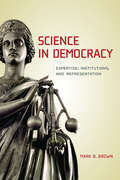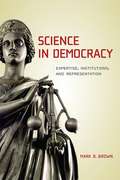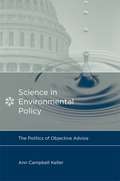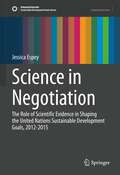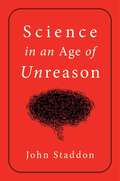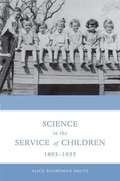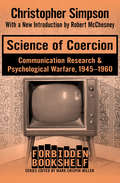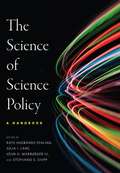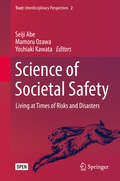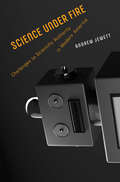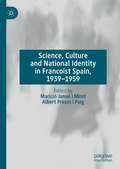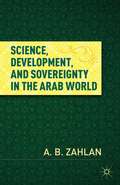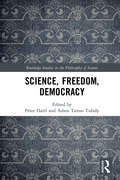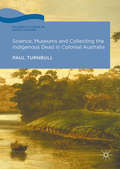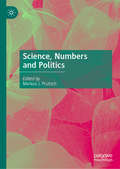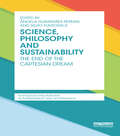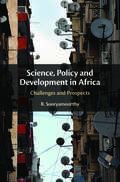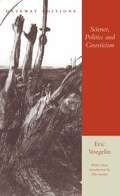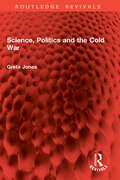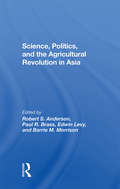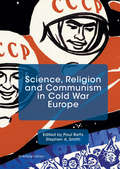- Table View
- List View
Science for a Green New Deal: Connecting Climate, Economics, and Social Justice
by Eric A. DavidsonScience, not politics, can take us beyond the hype and headlines to forge a realistic green new deal.Since it was first proposed in the US House of Representatives, the Green New Deal has been hotly debated, often using partisan characterizations that critique it as extreme or socialist. The intent was not simply to fight climate change or address a specific environmental concern, but rather to tackle how climate change and other environmental challenges affect the economy, the vulnerable, and social justice—and vice versa. In Science for a Green New Deal, Eric Davidson dissects this legislative resolution. He also shows how green new deal thinking offers a framework for a much-needed convergence of the natural sciences, social science, economics, and community engagement to develop holistic policy solutions to the most pressing issues of our day. Davidson weaves the case for linkages among multiple global crises, including a pandemic that has reversed progress on fighting poverty and hunger, an acceleration of climate change that has exacerbated storms, floods, droughts, and fires, and a renewed awareness of profound social injustices highlighted by the Black Lives Matter movement.Illustrating these points with his personal life experiences as a child growing up in Montana and as a famed researcher leading a large scientific society, Davidson relates these complex challenges to our everyday lives and decision-making. How, he asks, can we extract from the Earth's resources what we need for the prosperity, well-being, and dignity of current and future generations of billions of people without exhausting or polluting those resources? Written in clear, jargon-free prose, Science for a Green New Deal is a realistic and optimistic look at how we can attain a more sustainable, prosperous, and just future.
Science for the Empire
by Hiromi MizunoMizuno (history, U. of Minnesota) explores the relationship between discourses of science, nationalism, and modernity in Imperial Japan, particularly focusing on competing promotions of science amongst Japanese technology-bureaucrats, Marxist intellectuals, and popular science writers engaged in the developing the new genre of popular science (tsuzoku kagagku) journalism and how those competing visions were eventually co-opted and mobilized by the Imperial state in support of wartime objectives. Annotation ©2009 Book News, Inc. , Portland, OR (booknews. com)
Science for the Sustainable City: Empirical Insights from the Baltimore School of Urban Ecology
by J. Morgan Grove Mary L. Cadenasso Steward T. A. Pickett Elena G. Irwin Emma J. Rosi Christopher M. SwanA presentation of key findings and insights from over two decades of research, education, and community engagement in the acclaimed Baltimore Ecosystem Study In a world of more than seven billion people—who mostly reside in cities and towns—the Baltimore Ecosystem Study is recognized as a pioneer in modern urban social-ecological science. After two decades of research, education, and community engagement, there are insights to share, generalizations to examine, and research needs to highlight. This timely volume synthesizes the key findings, melds the perspectives of different disciplines, and celebrates the benefits of interacting with diverse communities and institutions in improving Baltimore’s ecology. These widely applicable insights from Baltimore contribute to our understanding the ecology of other cities, provide a comparison for the global process of urbanization, and inform establishment of urban ecological research elsewhere. Comprehensive, interdisciplinary, and highly original, it gives voice to the wide array of specialists who have contributed to this living urban laboratory.
Science in Canada: Selections from the Speeches of E.W.R. Steacie
by J. D. BabbittThe relationship between science and government, currently the subject of much lively debate, was one to which E.W.R. Steacie devoted a great deal of his energy and outstanding talents. As President of the National Research Council, a key position which he held for ten years, Dr. Steacie played an important role through the inspiration and direction that he gave to science in Canada. He was an outspoken critic of any attempt to formulate a broad general plan for science, and of any intrusion of administrative considerations into scientific establishments. At the time of his death in 1962 Dr. Steacie was the accepted leader of Canadian Science, as J.D. Babbitt says in the Introduction to this book. He goes on to say that this was a distinction he had attained 'not alone because of his official position as President of the National Research Council but also because of his outstanding research accomplishments, his sure feel for scientific values, and his strong personality. In Dr. Steacie official position and personal ability were happily matched; it seemed almost that the wide responsibilities of the National Research Council had been designed with such a man in view.' E.W.R. Steacie joined the National Research Council of Canada in 1939 as Director of the Division of Chemistry, became Vice-President (Scientific) in 1950 and, in 1952, President of the Council. He served as President for ten years, and during that time delivered more than 90 speeches and addresses. Using extracts from these speeches, Dr. Babbitt has skillfully brought together the remarks of Dr. Steacie on the development of science in Canada and has given an orderly presentation of his views on the organization of scientific activities. The topics covered include Science and the University, Science and the Humanities, Science and the National Academy, Science and Society, Government Science, Industrial Science, and International Science. Dr. Steacie's pungent, almost aphoristic style, and the directness of his statements will make this book an exciting and important one not only for scientists who are vitally concerned with the questions he considers, but also for that section of the general public who has for too long heard only the opinions of non-scientists--strongly felt, but often ill informed--on the relationship of science and society.
Science in Democracy: Expertise, Institutions, and Representation
by Mark B. BrownAn argument that draws on canonical and contemporary thinkers in political theory and science studies—from Machiavelli to Latour—for insights on bringing scientific expertise into representative democracy. Public controversies over issues ranging from global warming to biotechnology have politicized scientific expertise and research. Some respond with calls for restoring a golden age of value-free science. More promising efforts seek to democratize science. But what does that mean? Can it go beyond the typical focus on public participation? How does the politics of science challenge prevailing views of democracy? In Science in Democracy, Mark Brown draws on science and technology studies, democratic theory, and the history of political thought to show why an adequate response to politicized science depends on rethinking both science and democracy. Brown enlists such canonical and contemporary thinkers as Machiavelli, Hobbes, Rousseau, Dewey, and Latour to argue that the familiar dichotomy between politics and science reinforces a similar dichotomy between direct democracy and representative government. He then develops an alternative perspective based on the mutual shaping of participation and representation in both science and politics. Political representation requires scientific expertise, and scientific institutions may become sites of political representation. Brown illustrates his argument with examples from expert advisory committees, bioethics councils, and lay forums. Different institutional venues, he shows, mediate different elements of democratic representation. If we understand democracy as an institutionally distributed process of collective representation, Brown argues, it becomes easier to see the politicization of science not as a threat to democracy but as an opportunity for it.
Science in Democracy: Expertise, Institutions, and Representations
by Mark B. BrownPublic controversies over issues ranging from global warming to biotechnology have politicized scientific expertise and research. Some respond with calls for restoring a golden age of value-free science. More promising efforts seek to democratize science. But what does that mean? Can it go beyond the typical focus on public participation? How does the politics of science challenge prevailing views of democracy? In Science in Democracy, Mark Brown draws on science and technology studies, democratic theory, and the history of political thought to show why an adequate response to politicized science depends on rethinking both science and democracy.<P> Brown enlists such canonical and contemporary thinkers as Machiavelli, Hobbes, Rousseau, Dewey, and Latour to argue that the familiar dichotomy between politics and science reinforces a similar dichotomy between direct democracy and representative government. He then develops an alternative perspective based on the mutual shaping of participation and representation in both science and politics. Political representation requires scientific expertise, and scientific institutions may become sites of political representation. Brown illustrates his argument with examples from expert advisory committees, bioethics councils, and lay forums. Different institutional venues, he shows, mediate different elements of democratic representation. If we understand democracy as an institutionally distributed process of collective representation, Brown argues, it becomes easier to see the politicization of science not as a threat to democracy but as an opportunity for it.
Science in Environmental Policy: The Politics of Objective Advice
by Ann Campbell KellerScientists often bring issues to the policy agenda, translating scientific questions into everyday language and political terms. When Roger Revelle characterized Earth as a spaceship in testimony to Congress in 1957, his evocative language framed the issue of our planet's climate vulnerability in a way that technical discourse could not. In this book, Ann Campbell Keller examines the influence of scientists on environmental policymaking and makes the novel argument that scientists' adherence to the role of neutral advisor varies over the course of the policymaking process. Keller divides the policy process into three stages--agenda setting, legislation, and implementation--and compares scientists' influence on acid rain and climate change policy at these different stages over the course of several decades. She finds that scientists face more pressure to uphold the ideal of objectivity as policy-making processes advance and become more formalized, and thus are more likely to engage in advocacy and persuasion in the earlier, less formal, agenda-setting stage of the process. In the later, more structured legislative and implementation phases, scientists--working hard to give the appearance of neutral expertise--cede the role of persuader to others. Keller draws on theoretical work in political science and science studies and on empirical evidence from scientific reports, news coverage, congressional hearings, and interviews. Focusing on comparable cases and considering scientists' participation in them over time, she offers unique insights into how the context of decision making affects scientists' policy influence and emphasizes the multiple pathways by which scientific meaning is constructed in public settings.
Science in Negotiation: The Role of Scientific Evidence in Shaping the United Nations Sustainable Development Goals, 2012-2015 (Sustainable Development Goals Series)
by Jessica EspeyThis book explores the role of scientific evidence within United Nations (UN) deliberation by examining the negotiation of the Sustainable Development Goals (SDGs), endorsed by Member States in 2015. Using the SDGs as a case study, this book addresses a key gap in our understanding of the role of evidence in contemporary international policy-making. It is structured around three overarching questions: (1) how does scientific evidence influence multilateral policy development within the UN General Assembly? (2) how did evidence shape the goals and targets that constitute the SDGs?; and (3) how did institutional arrangements and non-state actor engagements mediate the evidence-to-policy process in the development of the SDGs? The ultimate intention is to tease out lessons on global policy-making and to understand the influence of different evidence inputs and institutional factors in shaping outcomes. To understand the value afforded to scientific evidence within multilateral deliberation, a conceptual framework is provided drawing upon literature from policy studies and political science, including recent theories of evidence-informed policy-making and new institutionalism. It posits that the success or failure of evidence informing global political processes rests upon the representation and access of scientific stakeholders, levels of community organisation, the framing and presentation of evidence, and time, including the duration over which evidence and key conceptual ideas are presented. Cutting across the discussion is the fundamental question of whose evidence counts and how expertise is defined? The framework is tested with specific reference to three themes that were prominent during the SDG negotiation process; public health (articulated in SDG 3), urban sustainability (articulated in SDG 11), and data and information systems (which were a cross-cutting theme of the dialogue). Within each, scientific communities had specific demands and through an exploration of key literature, including evidence inputs and UN documentation, as well as through key informant interviews, the translation of these scientific ideas into policy priorities is uncovered. The intended audiences of this book include academic practitioners studying evidence to policy processes, multilateral negotiation and/or UN policy planning. The book also intends to provide useful insights for policy makers, including UN diplomats, officials and staff working to improve the quality of evidence communication and uptake within multilateral institutions. Finally, it aims to support the whole global academic and scientific community, including students of public policy and political science, by providing insights on how to input into, influence, and even shape international evidence-informed policy-making.
Science in an Age of Unreason
by John StaddonScience is undergoing an identity crisis! A renown psychologist and biologist diagnoses our age of wishful, magical thinking and blasts out a clarion call for a return to reason and the search for objective knowledge and truth. Fans of Matt Ridley and Nicholas Wade will adore this trenchant meditation and call to action.Science is in trouble. Real questions in desperate need of answers—especially those surrounding ethnicity, gender, climate change, and almost anything related to &‘health and safety&’—are swiftly buckling to the fiery societal demands of what ought to be rather than what is. These foregone conclusions may be comforting, but each capitulation to modernity&’s whims threatens the integrity of scientific inquiry. Can true, fact-based discovery be redeemed? In Science in an Age of Unreason, legendary professor of psychology and biology, John Staddon, unveils the identity crisis afflicting today&’s scientific community, and provides an actionable path to recovery. With intellectual depth and literary flair, Staddon answers pressing questions, including: Is science, especially the science of evolution, a religion? Can ethics be derived from science at all? How sound is social science, particularly surrounding today&’s most controversial topics? How can passions be separated from facts? Informed by decades of expertise, Science in an Age of Unreason is a clarion call to rebirth academia as a beacon of reason and truth in a society demanding its unconditional submission.
Science in the Service of Children, 1893-1935
by Alice Boardman Smuts Robert W. Smuts R. Malcolm Smuts Barbara B. Smuts P. Lindsay Chase-LansdaleThis book is the first comprehensive history of the development of child study during the early part of the twentieth century. Most nineteenth-century scientists deemed children unsuitable subjects for study, and parents were hostile to the idea. But by 1935, the study of the child was a thriving scientific and professional field. Here, Alice Boardman Smuts shows how interrelated movements-social and scientific-combined to transform the study of the child. Drawing on nationwide archives and extensive interviews with child study pioneers, Smuts recounts the role of social reformers, philanthropists, and progressive scientists who established new institutions with new ways of studying children. Part history of science and part social history, this book describes a fascinating era when the normal child was studied for the first time, a child guidance movement emerged, and the newly created federal Children's Bureau conducted pathbreaking sociological studies of children.
Science of Coercion: Communication Research & Psychological Warfare, 1945–1960 (Forbidden Bookshelf #13)
by Christopher SimpsonA provocative and eye-opening study of the essential role the US military and the Central Intelligence Agency played in the advancement of communication studies during the Cold War era, now with a new introduction by Robert W. McChesney and a new preface by the author Since the mid-twentieth century, the great advances in our knowledge about the most effective methods of mass communication and persuasion have been visible in a wide range of professional fields, including journalism, marketing, public relations, interrogation, and public opinion studies. However, the birth of the modern science of mass communication had surprising and somewhat troubling midwives: the military and covert intelligence arms of the US government. In this fascinating study, author Christopher Simpson uses long-classified documents from the Pentagon, the CIA, and other national security agencies to demonstrate how this seemingly benign social science grew directly out of secret government-funded research into psychological warfare. It reveals that many of the most respected pioneers in the field of communication science were knowingly complicit in America&’s Cold War efforts, regardless of their personal politics or individual moralities, and that their findings on mass communication were eventually employed for the purposes of propaganda, subversion, intimidation, and counterinsurgency. An important, thought-provoking work, Science of Coercion shines a blazing light into a hitherto remote and shadowy corner of Cold War history.
Science of Science and Innovation Policy
by Kaye Husbands FealingBasic scientific research and technological development have had an enormous impact on innovation, economic growth, and social well-being. Yet science policy debates have long been dominated by advocates for particular scientific fields or missions. In the absence of a deeper understanding of the changing framework in which innovation occurs, policymakers cannot predict how best to make and manage investments to exploit our most promising and important opportunities. Since 2005, a science of science policy has developed rapidly in response to policymakers' increased demands for better tools and the social sciences' capacity to provide them. The Science of Science Policy: A Handbook brings together some of the best and brightest minds working in science policy to explore the foundations of an evidence-based platform for the field. The contributions in this book provide an overview of the current state of the science of science policy from three angles: theoretical, empirical, and policy in practice. They offer perspectives from the broader social science, behavioral science, and policy communities on the fascinating challenges and prospects in this evolving arena. Drawing on domestic and international experiences, the text delivers insights about the critical questions that create a demand for a science of science policy.
Science of Societal Safety: Living At Times Of Risks And Disasters (Trust Ser. #2)
by Seiji Abe Mamoru Ozawa Yoshiaki KawataThis open access book covers comprehensive but fundamental principles and concepts of disaster and accident prevention and mitigation, countermeasures, and recovery from disasters or accidents including treatment and care of the victims. Safety and security problems in our society involve not only engineering but also social, legal, economic, cultural, and psychological issues. The enhancement needed for societal safety includes comprehensive activities of all aspects from precaution to recovery, not only of people but also of governments. In this context, the authors, members of the Faculty of Societal Safety Science, Kansai University, conducted many discussions and concluded that the major strategy is consistent independently of the type and magnitude of disaster or accident, being also the principle of the foundation of our faculty.The topics treated in this book are rather widely distributed but are well organized sequentially to provide a clear understanding of the principles of societal safety. In the first part the fundamental concepts of safety are discussed. The second part deals with risks in the societal and natural environment. Then follows, in the third part, a description of the quantitative estimation of risk and its assessment and management. The fourth part is devoted to disaster prevention, mitigation, and recovery systems. The final, fifth part presents a future perspective of societal safety science.Thorough reading of this introductory volume of societal safety science provides a clear image of the issues. This is largely because the Japanese have suffered often from natural disasters and not only have gained much valuable information about disasters but also have accumulated a store of experience. We are still in the process of reconstruction from the Great East Japan earthquake and the Fukushima nuclear power plant accident. This book is especially valuable therefore in studying the safety and security of people and their societies.
Science under Fire: Challenges to Scientific Authority in Modern America
by Andrew JewettAmericans have long been suspicious of experts and elites. This new history explains why so many have believed that science has the power to corrupt American culture. Americans today are often skeptical of scientific authority. Many conservatives dismiss climate change and Darwinism as liberal fictions, arguing that “tenured radicals” have coopted the sciences and other disciplines. Some progressives, especially in the universities, worry that science’s celebration of objectivity and neutrality masks its attachment to Eurocentric and patriarchal values. As we grapple with the implications of climate change and revolutions in fields from biotechnology to robotics to computing, it is crucial to understand how scientific authority functions—and where it has run up against political and cultural barriers. Science under Fire reconstructs a century of battles over the cultural implications of science in the United States. Andrew Jewett reveals a persistent current of criticism which maintains that scientists have injected faulty social philosophies into the nation’s bloodstream under the cover of neutrality. This charge of corruption has taken many forms and appeared among critics with a wide range of social, political, and theological views, but common to all is the argument that an ideologically compromised science has produced an array of social ills. Jewett shows that this suspicion of science has been a major force in American politics and culture by tracking its development, varied expressions, and potent consequences since the 1920s. Looking at today’s battles over science, Jewett argues that citizens and leaders must steer a course between, on the one hand, the naïve image of science as a pristine, value-neutral form of knowledge, and, on the other, the assumption that scientists’ claims are merely ideologies masquerading as truths.
Science, Culture and National Identity in Francoist Spain, 1939–1959
by Marició Janué i Miret Albert Presas i PuigThis book examines the role that science and culture held as instruments of nationalization policies during the first phase of the Franco regime in Spain. It considers the reciprocal relationship between political legitimacy and developments in science and culture, and explores the ‘nationalization’ efforts in Spain in the 1940s and 1950s, via the complex process of transmitting narratives of national identity, through ideas, representations and homogenizing practices. Taking an interdisciplinary approach, the volume features insights into how scientific and cultural language and symbols were used to formulate national identity, through institutions, resource distribution and specific national policies. Split into five parts, the collection considers policies in the Francoist ‘New State’, the role of women in these debates, and perspectives on the nationalization and internationalization efforts that made use of scientific and cultural spheres. Chapters also feature insights into cinema, literature, cultural diplomacy, mathematics and technology in debates on Catalonia, the Nuclear Energy Board, the Spanish National Research Council, and how scientific tools in Spain in this era fed into wider geopolitics with America and onto the UNESCO stage.
Science, Development, and Sovereignty in the Arab World
by A. B. ZahlanZahlan's detailed study examines recent and current performance of Arab countries and their organizations in scientific research in relation to their socio-economic development. It shows that the Arab countries are severely handicapped by a political economy dominated by technological dependence, corruption, and limited research collaboration.
Science, Freedom, Democracy (Routledge Studies in the Philosophy of Science)
by Péter HartlThis book addresses the complex relationship between the values of liberal democracy and the values associated with scientific research. The chapters explore how these values mutually reinforce or conflict with one another, in both historical and contemporary contexts. The contributors utilize various approaches to address this timely subject, including historical studies, philosophical analysis, and sociological case studies. The chapters cover a range of topics including academic freedom and autonomy, public control of science, the relationship between scientific pluralism and deliberative democracy, lay-expert relations in a democracy, and the threat of populism and autocracy to scientific inquiry. Taken together the essays demonstrate how democratic values and the epistemic and non-epistemic values associated with science are interconnected. Science, Freedom, Democracy will be of interest to scholars and graduate students working in philosophy of science, history of philosophy, sociology of science, political philosophy, and epistemology.
Science, Museums and Collecting the Indigenous Dead in Colonial Australia
by Paul TurnbullThis book draws on over twenty years' investigation of scientific archives in Europe, Australia, and other former British settler colonies. It explains how and why skulls and other bodily structures of Indigenous Australians became the focus of scientific curiosity about the nature and origins of human diversity from the early years of colonisation in the late eighteenth century to Australia achieving nationhood at the turn of the twentieth century. The last thirty years have seen the world's indigenous peoples seek the return of their ancestors' bodily remains from museums and medical schools throughout the western world. Turnbull reveals how the remains of the continent's first inhabitants were collected during the long nineteenth century by the plundering of their traditional burial places. He also explores the question of whether museums also acquired the bones of men and women who were killed in Australian frontier regions by military, armed police and settlers.
Science, Numbers and Politics
by Markus J. PrutschThis study explores the dynamic relationship between science, numbers and politics. What can scientific evidence realistically do in and for politics? The volume contributes to that debate by focusing on the role of “numbers” as a means by which knowledge is expressed and through which that knowledge can be transferred into the political realm. Based on the assumption that numbers are constantly being actively created, translated, and used, and that they need to be interpreted in their respective and particular contexts, it examines how numbers and quantifications are made ‘politically workable’, examining their production, their transition into the sphere of politics and their eventual use therein. Key questions that are addressed include: In what ways does scientific evidence affect political decision-making in the contemporary world? How and why did quantification come to play such an important role within democratic politics? What kind of work do scientific evidence and numbers do politically?
Science, Philosophy and Sustainability: The End of the Cartesian dream (Routledge Explorations in Sustainability and Governance)
by Angela Guimaraes Pereira Silvio FuntowiczFor science to remain a legitimate and trustworthy source of knowledge, society will have to engage in the collective processes of knowledge co-production, which not only includes science, but also other types of knowledge. This process of change has to include a new commitment to knowledge creation and transmission and its role in a plural society. This book proposes to consider new ways in which science can be used to sustain our planet and enrich our lives. It helps to release and reactivate social responsibility within contemporary science and technology. It reviews critically relevant cases of contemporary scientific practice within the Cartesian paradigm, relabelled as 'innovation research', promoted as essential for the progress and well-being of humanity, and characterised by high capital investment, centralised control of funding and quality, exclusive expertise, and a reductionism that is philosophical as well as methodological. This is an accessible and relevant book for scholars in Science and Technology Studies, History and Philosophy of Science, and Science, Engineering and Technology Ethics. Providing an array of concrete examples, it supports scientists, engineers and technical experts, as well as policy-makers and other non-technical professionals working with science and technology to re-direct their approach to global problems, in a more integrative, self-reflective and humble direction.
Science, Policy and Development in Africa: Challenges and Prospects
by R. SooryamoorthySince gaining political independence in the 1950s, science has rapidly become a prerequisite for national development within many African nations. Supported by international agencies, such as UNESCO, initiatives were taken to direct Africa on the road of scientific development, enabling contributions to world science and significant progress in many specific research areas. However, from a developmental perspective there remains the question of how science influences national development plans and strategies. How far are science policies integrated into the national development plans? What potential and challenges do science and technology pose for Africa and its prospects for wider development? Offering a comprehensive historical and empirical study of science in both colonial and post-colonial Africa, R. Sooryamoorthy brings to light the connections between science, policy and development in African nations. Focusing on understanding the widening gap in science and technology between developed and developing regions, and the integration (or lack of) with national development strategies, this study provides important insights into the potential opportunities and challenges facing Africa in the areas of science.
Science, Politics and Gnosticism: Two Essays (The Collected Works Of Eric Voegelin Series #5)
by Eric VoegelinThis concise classic is the most accessible work in the canon of one of the 20th century'sgreatest political scientists. Eric Voegelin here contends that certain modern movements, including Positivism, Hegelianism, Marxism, and the "God is Dead" movement, are variants of the Gnostic tradition of antiquity. Highly provocative, this book is essential reading for students of modern politics, philosophy, and religion. <P><P>Hailed by the American Political Science Review as "one of the most distinguished interpreters to Americans of the non-liberal streams of European thought," Professor Voegelin was director of the Institute for Political Science at the University of Munich as well as professor of political science and lecturer at numerous universities in the United States and Europe. <P><P>With a new introduction by Ellis Sandoz, professor of political science at Lousiana State University and director of the Eric Voegelin Institute for American Renasissance Studies.
Science, Politics and the Cold War (Routledge Revivals)
by Greta JonesFirst published in 1988, Science, Politics and the Cold War is a history of the cold-war era that demonstrates the extent to which science and scientists have been implicated in every aspect of the political process.The book discusses how politically aware scientists involved themselves in controversies relating to atomic technology and genetics, and how the science world became a battleground between competing ideologies. The politicisation of science is shown to go deeper than any individual issue—right-wing critics of the Soviet Union argued that true science and socialism were incompatible, whilst their opponents forwarded similar arguments about science and capitalism. At the same time, the science world always contained a powerful lobby for political non-alignment, a faction which saw and continues to see science as a force for internationalism. This volume analyses all these positions and draws out the main contours of the politics/science debate in this period.
Science, Politics, And The Agricultural Revolution In Asia
by Robert S Anderson Paul R Brass Edwin Levy Barrie MorrisonAgriculture in southern Asia has undergone a radical transformation in recent years, one that continues to alter the political economy of the area. Beyond the familiar elements of the green revolution, there has been an increase in resource exploitation for food production, and a rise in the economic and political strength of food producers, as wel
Science, Religion and Communism in Cold War Europe
by Stephen A. Smith Paul BettsReligion and science were fundamental aspects of Eastern European communist political culture from the very beginning, and remained in uneasy tension across the region over the decades. While both topics have long attracted a great deal of scholarly attention, they almost invariably have been studied discretely as separate stories. Religion, Science and Communism in Cold War Europe is the first scholarly effort to explore the delicate interface of religion, science and communism in Cold War Europe. It brings together an international team of researchers who address this relationship from a number of national viewpoints and thematic perspectives, ranging from mysticism to social science, space exploration to the socialist lifecycle, and architectural heritage to pop culture.
